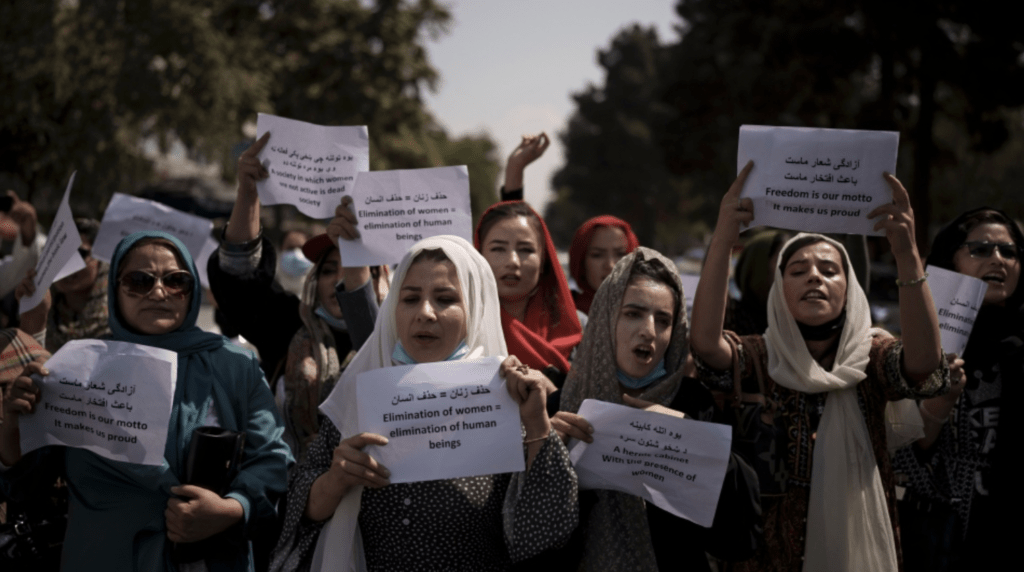Addressing Afghanistan’s Turmoil of Wicked Problems
 Women protest Taliban rule in Kabul on September 19, 2021/AP
Women protest Taliban rule in Kabul on September 19, 2021/AP
By Omar Samad
December 30, 2021
We keep hearing that Afghanistan is caught between a rock and a hard place, but in reality, the country and its impoverished population of more than 35 million (no accurate stats are available as no reliable census has ever been carried out) are caught in a compounded man-made and politically sensitive humanitarian crisis, unlike anything experienced in recent times.
Following the sudden departure of former President Ashraf Ghani and the entrance of Taliban forces into Kabul on August 15th, the United Nations and major donors imposed new restrictions while maintaining old sanctions affecting the Taliban. Since then, it is estimated that more than 24 million Afghans are now facing acute food insecurity, more than one million children could die of hunger this winter, while unemployment stands at more than 80%, banking services and liquidity are frozen, and more than 97% of Afghan families are living under the $2-per-day poverty line.
With government coffers empty, Afghan Central Bank assets (amounting to more than $9 billion) frozen under the new sanctions regime, and no country having yet recognized the Taliban administration, United Nations aid agencies and major non-governmental organizations (NGOs) are acting as a de facto substitute government, responsible for fundraising and aid delivery. As a result, more than $1.2 billion in emergency aid has thus far been pledged through the UN and NGOs to assist Afghans over the next few months. Per a recent Organisation of Islamic Cooperation (OIC) decision, another Afghanistan aid fund will be established by Islamic nations.
However, given the gravity of the situation, political and geopolitical tensions underlining the Taliban takeover, and to mitigate the dire consequences affecting millions of Afghans, the UN is planning “an $8 billion program of aid and services” for 2022, which would not only launch an appeal for $4.4 billion in prolonged humanitarian assistance, but also bypass the Taliban and offer governance and basic livelihood solutions costing another $3.6 billion to prevent a total economic collapse. The second tranche would not only fund schools and hospitals and pay salaries but also help farmers and small businesses that are struggling.
The Taliban have been slow and inconsistent with their previous pledges to create an inclusive setup and respect international human rights conventions. As a result, several dozen Taliban leaders remain blacklisted by the UN and other countries.
The fate of the frozen assets in US and European banks — as well as the remaining $1 billion in a World Bank trust fund earmarked for development work — is still unknown. Pressure is mounting on the Taliban to broaden the government to include representatives of non-Talib constituencies, professionals and, more importantly, to adhere to human rights conventions by relaxing restrictions on female employment and girls’ access to education.
For their part, the Taliban have been slow and inconsistent with their previous pledges to create an inclusive setup and respect international human rights conventions. As a result, several dozen Taliban leaders remain blacklisted by the UN and other countries.
The downside for Afghanistan’s struggling economy is evident as NGOs, the World Bank and UN agencies have moved their procurement and logistics operations to Pakistan and Central Asia. Moreover, between 20 to 50 percent of pledges are used to pay for administrative and security costs, and major parts of service delivery are handled by international organizations.
Although the U.S. treasury has allowed limited transactions, including remittances, to take place to help individuals and families receive aid, the scale of the humanitarian crisis needs a paradigm shift to revive the banking sector, stabilize the Afghani currency and prevent inflationary upticks by bypassing the Taliban network when necessary.
While some demand that policy be de-politicized and soft sanctions be lifted, others are still in favor of a punishment approach after the US withdrawal and Taliban takeover. The international community has maintained a common stance thus far but it is not guaranteed that by spring countries like China, Russia and some Islamic nations would want to maintain their current position.
Practical solutions demand a new toolbox that protects the population from the dire impact of hard sanctions while encouraging the Taliban to move toward a less intransigent position on issues that matter the most to Afghans and internationals.
Although the UN says it wants to prevent a mass exodus, instill confidence and not act as a de facto government, keeping the balance among effective aid delivery, service delivery, economic management, constructive engagement, local ownership and diverse political agendas might be the biggest challenge beyond the economic hardship felt by most Afghans after 20 years of war.
Omar Samad was Afghanistan’s ambassador to Canada from 2004-09 and to France from 2009-11. He was spokesperson for the Ministry of Foreign Affairs in Kabul from December 2001 to September 2004. He is currently a non-resident senior fellow at the Atlantic Council in Washington, D.C.
